Wage Inflation - A Bond Bull Turns Bearish
Economics / Inflation May 11, 2013 - 06:35 PM GMTBy: John_Mauldin
 "The large shortfall of employment relative to its maximum level has imposed huge burdens on all too many American households and represents a substantial social cost. In addition, prolonged economic weakness could harm the economy's productive potential for years to come. The long-term unemployed can see their skills erode, making these workers less attractive to employers. If these jobless workers were to become less employable, the natural rate of unemployment might rise or, to the extent that they leave the labor force, we could see a persistently lower rate of labor force participation." - Janet L. Yellen, Vice-Chair, US Federal Reserve, March 4, 2013
"The large shortfall of employment relative to its maximum level has imposed huge burdens on all too many American households and represents a substantial social cost. In addition, prolonged economic weakness could harm the economy's productive potential for years to come. The long-term unemployed can see their skills erode, making these workers less attractive to employers. If these jobless workers were to become less employable, the natural rate of unemployment might rise or, to the extent that they leave the labor force, we could see a persistently lower rate of labor force participation." - Janet L. Yellen, Vice-Chair, US Federal Reserve, March 4, 2013
It is graduation time, and this morning finds me swimming in a sea of fresh young faces as a young friend graduates, along with a thousand classmates. But to what? I concluded my final formal education efforts in late 1974, in the midst of a stagflationary recession, so it was not the best of times to be looking for work. It turned out that I had a far different future ahead of me than I envisioned then. But I would trade places with any of those kids who graduated today, as my vision of the next 40 years is actually very optimistic. With all the advances in healthcare, technology, and communications that have come and will come, they will get to embrace a world full of opportunity; and yet, this generation is starting out with more than just a minor economic handicap.
This week's letter will explore changes in the work marketplace, changes that generated quite a lot of discussion at last week's Strategic Investment Conference. At the end of the letter I will also provide a link for qualified investors to listen in on a webinar conversation between Kyle Bass and me on another of the main topics last week: Japan. This is one you'll want to tune in to. (Warning: this letter will read fast but print long, as there are more than the usual number of charts and graphs, though the word count is actually shorter than usual.)
And a quick note up front on Japan. As of the last two weeks, Japanese investors are now net buyers of foreign bonds, and the yen has broken through 100 to the dollar. I think what is happening in Japan is going to be the nexus of a global flow of cash that will be unlike any we have ever seen. Attention MUST be paid. It is windshield time.
David Rosenberg: A Bond Bull Turns Bearish
How do we get to full employment and improved national education from the launching point of David Rosenberg's very recent call (at the conference and elsewhere) that we will soon see inflation and the onset of a bond bear market? I must say that he surprised a few of us with his conversion from bond bull to bond bear. But the reason why he converted surprised us even more. I am not going to be able to do justice to his impeccably reasoned, highly detailed presentation in this short space, but let me hit some highlights.
Specifically, Rosie thinks that the Fed is going to be surprised by wage-push inflation. How could we see inflation in wages in such a soft labor market? That was the first question in my mind, and the following charts give me some reasons for my question.
The present unemployment rate is still higher than at any time in the last 60 years, except after recessions. The Great Recession ended four years ago, and unemployment is still stubbornly high. Indeed, this is the slowest "jobs recovery" we have ever experienced. The current level of unemployment has never been seen four years after the end of a recession.
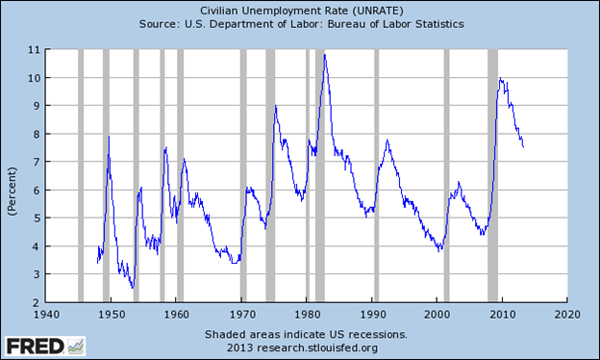
And those who lose their jobs are staying unemployed longer. The fact is that the mean duration of unemployment is still almost double what it has ever been. Average length of unemployment is 37 weeks. When the recession ended, it stood at 23 weeks. This is structural, not frictional, unemployment. Ninety million American adults now subsist outside the official labor force –It could be there's an underground economy that we need to capture. The pool of available labor for the business sector is shrinking 2% per year.
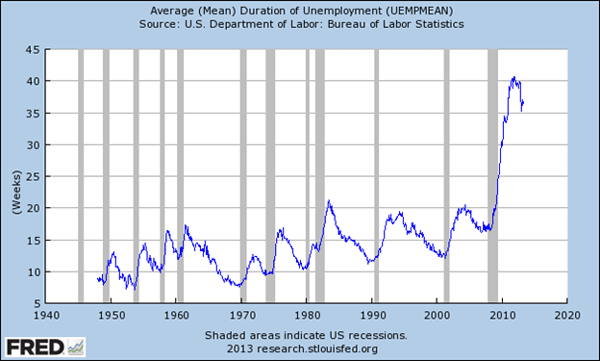
Worse yet, the unemployment rate is still stubbornly high in spite of an unprecedented rise in the number of people who are no longer counted as being in the labor force. These are people who are no longer looking for jobs.We are back to workforce participation levels not seen since the 1970s. A good 5% of US citizens who are able to work are no longer are looking for work. Part of this trend is due to alternatives to employment becoming easier to pursue. Millions have been added to the disability rolls – some 4 million since the beginning of this century and almost 2 million since the beginning of the Great Recession (and still rising at an alarming rate!). Others have gone back to school, borrowing money in the form of student loans, which have topped over $1 trillion and are the only form of consumer credit that has been on the increase.
As a quick aside, we are also seeing skyrocketing rates of late payments as student loans overwhelm the ability of borrowers to pay. This is a true crisis brewing, as student loans are the only type of debt that cannot be discharged in bankruptcy. Student loans can make you an indentured servant for a very long time.
Some would-be workers find that in some states they can collect more on government assistance than they can earn by working lower-wage jobs, and thus they have no economic incentive to look for jobs that would actually lower their income. As I wrote in a recent letter, this is why we are seeing a large rise in non-reported incomes and jobs. And finally, there are those who are just discouraged. Jobs seemingly do not exist for their skill sets and in places where they can access them.
With so many people not participating in the labor market, isn't it reasonable to assume that if jobs again ever become available, these people will rejoin the official workforce? And wouldn't that create a shadow supply of workers that would keep wages suppressed for a long time?
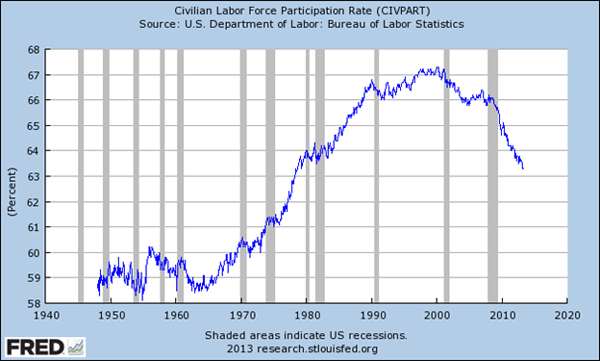
Maybe yes and maybe no. Rosie makes the case that there are numerous jobs available and that the numbers are rising, and there is data that supports his argument. I will reproduce here a few of his charts (out of the 59 he showed!). Job openings are on the rise and are back to levels last seen in the middle of the previous decade.
And what about all the businesses that have jobs on offer but can't find people to fill them? The following chart is from Rosie's and my mutual friend William Dunkelberg, chief economist for the National Federation of Independent Businesses. While job openings are not at all-time highs, the trend is encouraging.
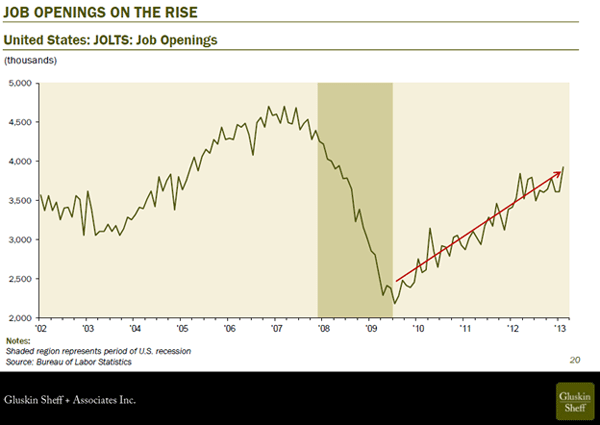
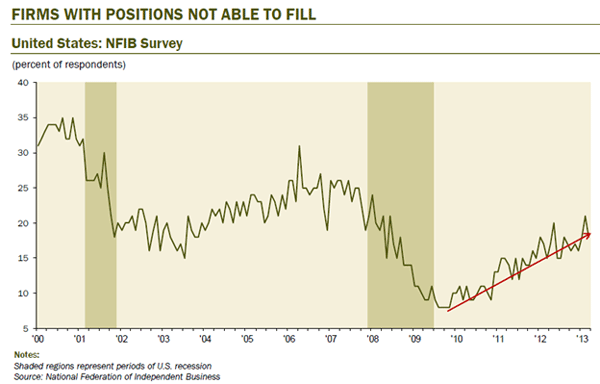
The next chart shows the ratio of job openings to new hires. It is at a six-year high. As Rosie stated (inexact quotes, from my notes):
Looking for labor? Labor demand is not weak – JOLTS survey shows job openings up 10%, employers can't find qualified applicants. Firings plunge, layoffs 10% lower than in 2007. Number of job quitters rises – people leaving jobs to go to new ones, the 'take this job and shove it index.' 7.5% unemployment is actually the new 4.4%.
What are companies doing? More overtime, longer work week. Combination of rising wages, productivity growth heading lower. We've taken a lot of inventory out of the labor market. Keep your eye on unit labor costs. Correlation with inflation – unit labor costs are on the rise.
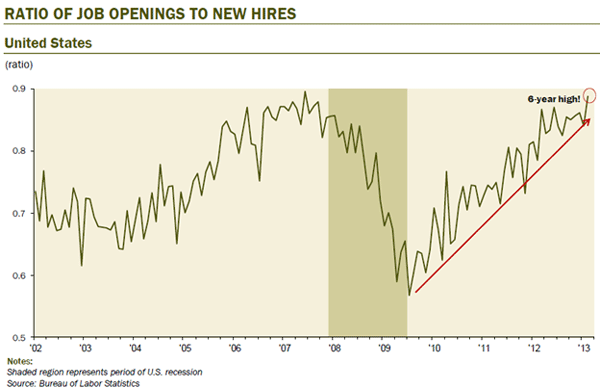
Employees are increasingly willing to leave a job and go to another one, yet productivity has recently begun to fall.
Yet young people are having increasing difficulty landing jobs. People aged 20-24 are still unemployed at levels not seen unless a recession is involved (see chart below). And research keeps coming in that more than 50% of college graduates are stuck in jobs for which a degree is not needed.
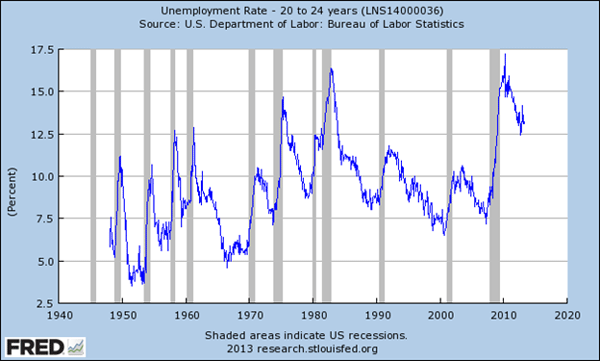
Even though the headline unemployment rate is falling, a large part of that drop is due to the precipitous plunge in the participation rate, as well as a rise in low-paying jobs. Curiously, it now seems a disproportionately high level of temporary jobs is no longer a precursor to economic recovery but is a new structural fixture.
Part of the responsibility for that increase in temporary employment can readily be laid at the feet of the Affordable Healthcare Act (Obamacare). Employers do not have to pay health insurance for temporary employees; that burden falls on the employee.
Healthcare for lower-wage employees can be a huge percentage of overall labor costs. While you may argue that employers should cover workers at all levels, the data coming in says that is not happening – thus the rise in temporary workers. Even an established employer like UPS is hiring new temporary employees in low-skill jobs at low wages without health insurance for their first year and cutting back on employees with major seniority (who cost more than double what new employees do), not giving them enough hours to survive and forcing them into the temporary market to meet their basic living needs.
We see evidence of this happening system-wide in the data showing lower hourly wages and a reduced number of hours in the work week. And those trends seem to be stabilizing. We are seeing the creation of a two-tier market, an upper tier for those with skills in demand and a lower one for those whose skills just do not command a premium in today's marketplace.
Rosie makes the argument that there is a shortage of skilled labor and that the price for those workers is going to rise, surprising the Federal Reserve, which still looks at historical data from a world that no longer exists. And he says this segment of the labor market is going to be large enough to create wage-push inflation.
It is an interesting argument, and contradicting David Rosenberg is generally not a good idea, although he did not convince Lacy Hunt or Gary Shilling, at least not at the conference. But at any turn there is always someone who has to lead the way. His arguments are something we must pay attention to.
In the panel discussion later in the day, I agreed that there are two labor markets, but the divide is between workers with skills that are in demand and workers whose jobs require no special experience or education.
I am writing part of this week's letter in the rafters of a huge auditorium as I watch 1100 liberal art graduates at a major university receive their degrees. (I long ago made a promise to be here.) This was an expensive education, and the graduates are smart; yet when you ask them what their plans are, all too often you hear that they have not been able to find jobs or are opting to continue with school, often borrowing yet more money to do so, as they see no other viable options.
Recent research suggests that the cost/benefit ratio for education is not as good as it once was. See for example this article by Jeff Selingo.
Education – at least in the conventional sense – is not always necessary for job success. All too often it is the enemy of success. Yet the fallacy persists among the unemployed that "going back to school" will somehow solve their problems.
In most cases, it will not. The unemployed do not need more school; what they need are more skills. Why? Because what employers need are abilities. Workers are essentially a delivery mechanism for the ability to do whatever the employer happens to need done. This is not to say that formal education is unimportant; it is critically important – but not for the reason most people expect.
Degrees and diplomas are credentials. They do not, in and of themselves, guarantee that the holder possesses the skill an employer wants. They serve as screening tools, used to reduce a long list of applicants to a smaller number for closer review.
Employers want workers with the necessary skills. Workers want an employer who values their particular skills. When a match is made, everyone wins. Skills are the key to every match.
Skills can be acquired in school, of course. Indeed, it is impossible to spend thousands of hours in classrooms during one's formative years, while the brain is in peak learning mode, without acquiring at least some kind of skill. Children and adolescents are highly tuned skill-acquisition machines.
If schools produced the right number of students with the right sets of skills, the economy would be much closer to full employment. Something is wrong somewhere.
Yet those with college degrees are clearly able to find jobs of some kind. The unemployment level for college graduates is about half that of high school grads and almost three times better than for those with no high school degree. Education does matter.
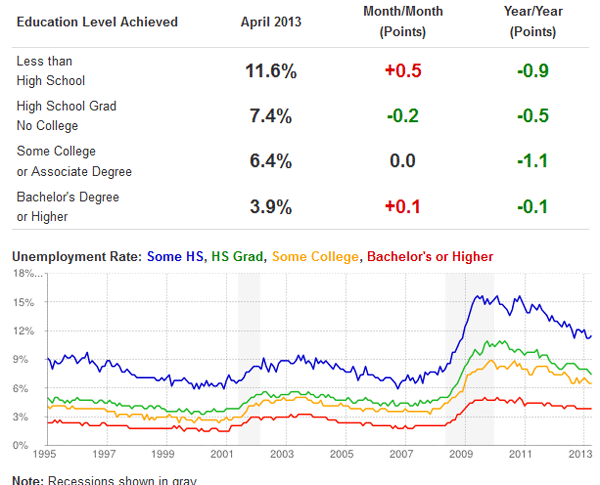
Michael Ellsberg gives us one reason for that seeming advantage a degree delivers:
True, people with college degrees tend to earn more. But that could be because most ambitious people tend to go to college; there is little evidence to suggest that the same ambitious people would earn less without college degrees (particularly if they mastered true business and networking grit).
And while most people who end up starting businesses likely have college degrees, those degree-bearers should be well aware (as they learned in their freshman statistics classes) that correlation does not equal causation. Assuming that college was responsible for their success gives higher education more credit than it deserves. (New York Times: Will Dropouts Save America?)
America, as Ellsberg describes it, has yet another way to divide today's job market into two pieces: formal and informal. The "formal" job market is the old-fashioned one in which employers advertise and workers send resumes. It was never as effective as people thought. Successful professionals and business owners have long preferred the second, informal market.
When you need someone who can do X, you ask trusted friends and colleagues who they know. You will usually find a well-qualified candidate in short order. (And now you use LinkedIn and other social media.)
What role does your wall-decorating degree play in this process? A little – and a lot. If you can do what needs to be done, employers usually won't care where (or if) you went to college. But, since they turn to people they know when they search for candidates, and since our lifelong friendships are so often formed in college, being "in the circle" increases your odds of being known to the right people at the right time.
The old saying is then somewhat true: it isn't just what you know; it's who you know.
Further, if you advertise for a new employee today on one of the online job boards, you can get hundreds of resumes. Most are just people sending you a resume in hopes of attracting attention, but you can still get an overwhelming number of potential employees. How do you sort? One way is by education. That degree helps you sort, even when the job really does not require a degree.
But the skills advantage shows up in the next graph. Notice that the older you get, the lower your likelihood of being unemployed. As I have shown in previous letters, Boomers are not only working more than any other age cohort, they are taking market share from the 20-somethings. In fact, as of less than a year ago, 100% of the overall increase in jobs was going to those age 55 and up. Young people were actually losing ground in what was already a slow jobs recovery.
The reasons are trite but obvious. We Boomers have not saved enough to retire and must keep working. Given our fewer remaining work years, we'll work where we can and for what we can get. And then there are those of us who simply have no interest in anything that looks like traditional retirement. We are living longer and healthier lives than previous generations enjoyed, and there are simply more of us.
Even the youngest Boomer probably has 35-40 years of work experience and a lot of acquired skills. Young people may have more energy, but many jobs are not a function of simple energy and enthusiasm. Go into a Barnes and Noble or any number of other stores and notice the ages of those working. There are young people, sure, but I see my age peers as well. I didn't see that 20 years ago. And those "starter" jobs are where workers gain experience.

We have policies in place that encourage young people to load up on debt to get that degree. We need to create programs that match skills and jobs and that give employers incentives to hire and train those younger workers.
As Paul McCulley said at the conference last week,
Ages 22-27 are the years that really matter for your lifetime of financial security. We now have a job market that is the antithesis of what you and I graduated into.
That is a structural phenomenon, not cyclical. It will not heal itself with platitudes about more and better education. New businesses are being formed at the lowest rate in generations. Over the long term, the growth in the job market comes from new businesses. Want to create jobs? Stop increasing costs and regulations and making it harder for entrepreneurs to get started.
And get the SEC to issue the rules that Congress mandated they write over a year ago (the much-ballyhooed JOBS Act), which will make it possible for new ventures to publicly announce their need for capital on the internet without running afoul of the current regulations. The SEC is way behind the 90-day deadline specified in the act. The law as written by Congress is clear. Those groups lobbying for the status quo and standing in the way need to step aside. You are costing young people future jobs. Those are MY kids. And everyone else's.
(Just for the record, I am an equal opportunity employer. I have younger and older employees, all genders and races. Talent and a solid work ethic are the currency I look for.)
As you know, I am a firm believer that the state of the global economy is such that we as investors need to be diversified, flexible, and opportunistic. Consequently, I spend a great deal of time and effort looking into alternative investment strategies and managers. The Mauldin Circle program was created specifically to provide access to "best of breed" alternatives managers that I believe in. That's why I am particularly pleased to announce an upcoming Mauldin Circle webinar event featuring Kyle Bass of Hayman Capital Management, LP.
Many readers will recognize Kyle as one of the few investors who successfully predicted and profited from the subprime mortgage crisis in 2008, making significant gains for his investors. He has since continued to make well-defined predictions on the European sovereign-debt crisis and is a leading provocateur on the unsustainability of Japan's debt.
Please join my partners at Altegris Investments for this special webinar on May 29th and learn more about how Kyle is globally positioned to leverage his investment thesis. This may be the most compelling discussion that you hear all year. I will be in Brussels talking with thought leaders and EU politicians, and Kyle will just be back from Asia and a deep dive into Japan, so we will be giving you the view from both sides.
If you are a qualified purchaser or a licensed investment adviser, qualified to make private placement recommendations, please join us for this exclusive Mauldin Circle webinar on Wednesday, May 29, at 12:00 EDT/9 PDT. Be sure to register here for this event – it will be one of the most interesting discussions of the year.
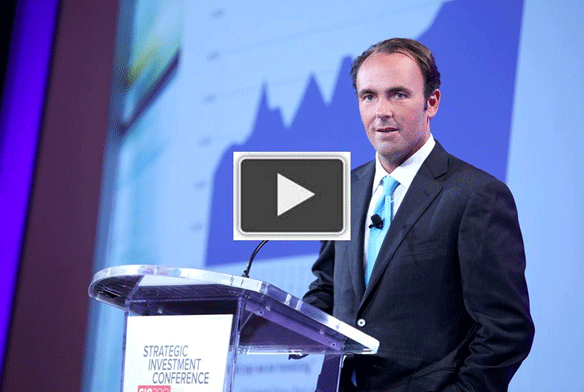
Upon qualification by my partners at Altegris, you will receive an email invitation. I apologize for limiting this discussion to qualified purchasers and investment advisors, but we must follow the rules and regulations. I look forward to having you at this exclusive Mauldin Circle event. (In this regard, I am president and a registered representative of Millenium Wave Securities, LLC, member FINRA.)
Tulsa, Atlanta, Nashville, and Brussels
The conference last week was powerful and inspiring. But before we got started, I took time to visit with some of the team at International Stem Cell. We spent a good deal of time going over the exciting research they are doing on stem cells and Parkinson's disease. Even though I have not written about biotech in a long time, I still follow the industry closely. There is just so much promise of real breakthroughs everywhere I look.
Yes, ISCO is the company that launched the Lifeline Skin Care product that I have written about. Almost a dozen people at the conference came up and thanked me for recommending they try it. The skin crème is a follow-on of research they were doing on growing skin for burn victims. It is not a miracle, but it has made a difference to many, and the product helps support their far more important research on diseases such as Parkinson's. You can learn about Lifeline at http://bit.ly/0504md.
I believe we will see cures for many of the conditions that afflict us and have so far eluded treatment. I will be writing on my latest biotech findings in future letters.
I leave for Tulsa next weekend to "give away" my daughter Abbi to her fiancé, Stephen. Just Abbi, Stephen, and 200 of their closest friends. "Dad, we just can't cut the list any more!"
The following Wednesday I head for Atlanta for a board meeting of Galectin Therapeutics (another biotech I follow) and then move on the next day to Nashville for a presentation for my partners at Altegris Investments. Then it's back home for a day or so before I fly for Brussels for a speech. I might stop over in London before heading back, but one way or another I'll be spending extensive time with Jonathan Tepper, my Endgame co-author.
It is time to hit the send button and race to the airport. Dallas has a newly built terminal to replace the old one at Love Field. It is very nice and a true upgrade, but there the same old TSA drill and long lines await me. I know there is better technology available than what we are forced to endure. We pay for all this, and those workers are not cheap. Where is the new technology to make airport security faster and more efficient? But kudos to the head of the FCC telling the FAA to allow us to use our iPads as we take off. The FAA is so behind in so many small ways that add up to a bad overall customer experience.
Have a great week. And figure out how to hire an able young person!
Your started to work at the tender age of 10 analyst,
John Mauldin
subscribers@MauldinEconomics.com
Outside the Box is a free weekly economic e-letter by best-selling author and renowned financial expert, John Mauldin. You can learn more and get your free subscription by visiting www.JohnMauldin.com.
Please write to johnmauldin@2000wave.com to inform us of any reproductions, including when and where copy will be reproduced. You must keep the letter intact, from introduction to disclaimers. If you would like to quote brief portions only, please reference www.JohnMauldin.com.
John Mauldin, Best-Selling author and recognized financial expert, is also editor of the free Thoughts From the Frontline that goes to over 1 million readers each week. For more information on John or his FREE weekly economic letter go to: http://www.frontlinethoughts.com/
To subscribe to John Mauldin's E-Letter please click here:http://www.frontlinethoughts.com/subscribe.asp
Copyright 2013 John Mauldin. All Rights Reserved
Note: John Mauldin is the President of Millennium Wave Advisors, LLC (MWA), which is an investment advisory firm registered with multiple states. John Mauldin is a registered representative of Millennium Wave Securities, LLC, (MWS), an FINRA registered broker-dealer. MWS is also a Commodity Pool Operator (CPO) and a Commodity Trading Advisor (CTA) registered with the CFTC, as well as an Introducing Broker (IB). Millennium Wave Investments is a dba of MWA LLC and MWS LLC. Millennium Wave Investments cooperates in the consulting on and marketing of private investment offerings with other independent firms such as Altegris Investments; Absolute Return Partners, LLP; Plexus Asset Management; Fynn Capital; and Nicola Wealth Management. Funds recommended by Mauldin may pay a portion of their fees to these independent firms, who will share 1/3 of those fees with MWS and thus with Mauldin. Any views expressed herein are provided for information purposes only and should not be construed in any way as an offer, an endorsement, or inducement to invest with any CTA, fund, or program mentioned here or elsewhere. Before seeking any advisor's services or making an investment in a fund, investors must read and examine thoroughly the respective disclosure document or offering memorandum. Since these firms and Mauldin receive fees from the funds they recommend/market, they only recommend/market products with which they have been able to negotiate fee arrangements.
Opinions expressed in these reports may change without prior notice. John Mauldin and/or the staffs at Millennium Wave Advisors, LLC and InvestorsInsight Publishing, Inc. ("InvestorsInsight") may or may not have investments in any funds cited above.
Disclaimer PAST RESULTS ARE NOT INDICATIVE OF FUTURE RESULTS. THERE IS RISK OF LOSS AS WELL AS THE OPPORTUNITY FOR GAIN WHEN INVESTING IN MANAGED FUNDS. WHEN CONSIDERING ALTERNATIVE INVESTMENTS, INCLUDING HEDGE FUNDS, YOU SHOULD CONSIDER VARIOUS RISKS INCLUDING THE FACT THAT SOME PRODUCTS: OFTEN ENGAGE IN LEVERAGING AND OTHER SPECULATIVE INVESTMENT PRACTICES THAT MAY INCREASE THE RISK OF INVESTMENT LOSS, CAN BE ILLIQUID, ARE NOT REQUIRED TO PROVIDE PERIODIC PRICING OR VALUATION INFORMATION TO INVESTORS, MAY INVOLVE COMPLEX TAX STRUCTURES AND DELAYS IN DISTRIBUTING IMPORTANT TAX INFORMATION, ARE NOT SUBJECT TO THE SAME REGULATORY REQUIREMENTS AS MUTUAL FUNDS, OFTEN CHARGE HIGH FEES, AND IN MANY CASES THE UNDERLYING INVESTMENTS ARE NOT TRANSPARENT AND ARE KNOWN ONLY TO THE INVESTMENT MANAGER.
John Mauldin Archive |
© 2005-2022 http://www.MarketOracle.co.uk - The Market Oracle is a FREE Daily Financial Markets Analysis & Forecasting online publication.



